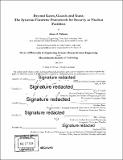Beyond gates, guards and guns : the systems-theoretic framework for security at nuclear facilities
Author(s)
Williams, Adam D.(Adam David),Ph. D.Massachusetts Institute of Technology.
Download1126791919-MIT.pdf (62.97Mb)
Alternative title
Systems-theoretic framework for security at nuclear facilities
Other Contributors
Massachusetts Institute of Technology. Institute for Data, Systems, and Society.
Advisor
John S. Carroll.
Terms of use
Metadata
Show full item recordAbstract
Current approaches to nuclear security can produce elegantly designed physical protection systems (PPS) that may be limited by untenable assumptions or well stated-albeit vague and imprecise-descriptions of how to improve nuclear security culture itself. According to one nuclear security culture expert: While the International Atomic Energy Agency has released methodologies on evaluating vulnerabilities and physical protection, it has not yet introduced guidelines on assessing the human-factor in detection, delay, and response. (Khripunov, 2014, pp. 39-40) (Emphasis added) This dissertation argues that such a link lies in understanding how organizational influences affect the completion of tasks required for PPS to meet expected nuclear security performance goals. In this dissertation, I propose the System-Theoretic Framework for Security (the STFS) for evaluating system-level interactions between PPS and human/organizational behaviors to describe overall security performance. Invoking key tenets of systems theory and organization science, the STFS uses the concept of "security task completion" to explain how the interactions between PPS and human/organizational behaviors result in security performance at nuclear facilities. Yet, empirical data is needed to explore the efficacy of this approach for incorporating organizational influences into security performance. As such, my research objectives were to: 1. Improve the understanding of how PPS and human/organizational behaviors interact to produce security performance at nuclear facilities, 2. Identify a manageable (but not exhaustive) set of organizational influences on this interaction, and 3. Develop a framework for assessing these interactions and organizational influences on security performance at nuclear facilities. I used a mixed methods research design to develop the STFS. My first study consisted of 18 narrative interviews across different areas of nuclear security expertise and my second study examined the case of the 2012 security incident at the Y-12 National Security Complex. These two studies provided evidence for the security task completion construct (as a new causal mechanism), behavioral performance requirements (assumptions on which the causal mechanism is based), a set of organizational influences and quality indicators related to nuclear security performance. While this framework does not address every aspect of achieving high security performance, the STFS offers a structured thought process and direction for further development regarding how technologies and organizations interact to affect individual behaviors that contribute to security at nuclear facilities.
Description
Thesis: Ph. D. Engineering Systems: Human-Systems Engineering, Massachusetts Institute of Technology, School of Engineering, Institute for Data, Systems, and Society, 2018 Cataloged from PDF version of thesis. Includes bibliographical references (pages 146-152).
Date issued
2018Department
Massachusetts Institute of Technology. Institute for Data, Systems, and Society; Massachusetts Institute of Technology. Engineering Systems DivisionPublisher
Massachusetts Institute of Technology
Keywords
Institute for Data, Systems, and Society.